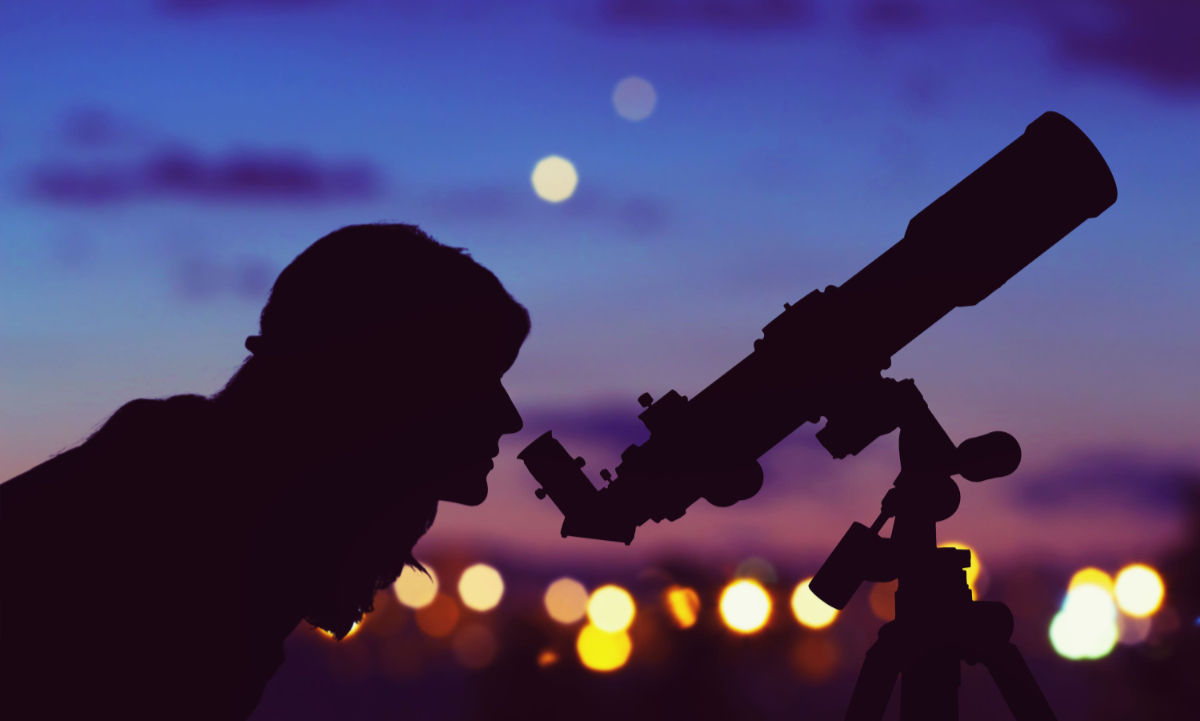Stargazing sessions are on the rise as a trendy form of mindful meditation – helping people to relieve stress and find mental silence in all things astral.
It’s a real back-to-basics form of escapism, and Neill Sanders astrologer and founder of Go Stargazing, says visits to his website increased ten-fold during lockdown.
Luckily we are blessed with a smorgasbord of dark-sky areas in the UK and Ireland, and the stars are ready to be explored by anyone who slows down and looks up.
Health benefits of stargazing
Here, Sanders shares some of the top wellbeing benefits of stargazing.
1. You get out into nature
With light pollution in towns and cities obstructing our view of the universe’s natural show, getting a good glimpse of the night skies requires you to head out into the great outdoors – and the benefits of being in nature are well documented.
According to one Finnish study, spending just 15 minutes sitting in nature can help us to feel psychologically refreshed, while multiple studies have linked nature walks with improved mental health.
“You really need to go to somewhere fairly rural and remote to see the best views of the stars, so you’ll often find yourself pitching up in a forest or by a reservoir,” says Sanders.
“Getting away from the city to an area of natural beauty, where you can see the likes of the Milky Way, can have a very profound effect on people.”
He continues: “Plus, with lockdown restrictions in place, lots of people are avoiding travelling abroad, so stargazing gives you the opportunity to staycation in some truly spectacular places.”
2. It can spark your creativity
“Astro-photography is such a big part of stargazing now and you can find some incredible images to inspire you on social media,” says Sanders, who believes that picking up a camera can help people tap into a whole new creative outlet.
“It’s very easy to take photographs of starry skies with a simple DSLR and tripod, but smartphone technology is so good now too, that many people shoot directly on their phones using night-time photography apps.”
3. It’s a stress reliever
A 2014 study suggested those who stargaze feel more connected to nature. A range of other benefits were also highlighted by participants, including experiencing positive emotions.
“From a health and wellbeing perspective, we’ve seen a huge increase in interest in astronomy in lockdown, as people have felt like they’re stuck at home with nowhere to go,” says Sanders. “More of us have been going out into the garden and looking at the stars; even some of the big telescope retailers have seen stock shortages because of the demands.
“It is a big stress-reliever,” he adds. “It’s a good way to escape the hustle and bustle of home life.”
4. It’s a social hobby
With social distancing measures in place, Sanders says that a lot of the UK’s stargazing events have been postponed or cancelled this year.
However, the great thing about astrology is that it can be as social as you like. The UK usually has a rolling calendar of popular Dark Skies festivals, which brings together astronomy and astro-photography enthusiasts to appreciate the stars together.
5. It’s always exciting
The world of stargazing never gets boring because there are always new natural wonders to enjoy.
“There are some cool things to see at the moment,” says Sanders. “The moon always looks fantastic but to the south there’s the bright planets Jupiter and Saturn that are visible in the evening. People might not realise that these two star-like objects are actually planets.
View this post on InstagramStayed up till 2am to see the Milky Way and the stars did not disappoint
Best of all, stargazing doesn’t involve a pricey membership or a big commitment. “Anyone can do it,” he says.
5 best telescopes for beginners
If you can’t wait to get started with enjoying the health benefits of stargazing, we’ve lined up 5 of the best telescopes for beginners at different price points to begin your stargazing adventure.
1. Celestron 21035 Travel Scope 70 Portable Refractor Telescope Kit with Backpack, £79.99 Amazon
Designed for beginners, this is one of the cheapest telescopes on the market for its specs. It comes with a 10mm and a 20mm eyepiece, as well as a Bluetooth adapter to take photos and videos with your phone.
Features include:
- Aperture 70mm
- Focal length 400mm (f/5.71)
- Weight 1.2kg
2. Celestron 22401 Inspire 70AZ Refractor Smartphone Adapter Built-In Refracting Telescope, £129.00 Amazon
The StarSense Explorer LT 70AZ is an easy-to-use, smartphone app-enabled telescope priced on the cheaper end of the scale. It is relatively small and lightweight with an adjustable tripod making it perfect for both young and older astronomers.
Features include:
- Aperture 70mm
- Focal length 700mm (f/10)
- Weight 3.35kg
3. SOLOMARK 114AZ Professional Reflector Telescope, £179.99 Amazon
The SOLOMARK 114AZ telescope comes fully kitted with lightweight tripod, phone mount and two lenses. This adjustable mid-range telescope gives you plenty to experiment with as you start your stargazing journey.
Features include:
- Aperture 114mm
- Focal length 500mm (f/8)
- Weight 6.2kg
4. Meade Dobson telescope N 130/650 LightBridge Mini 130 DOB, £255 Amazon
The Meade Dobson Telescope N 130/650 LightBridge Mini 130 DOB is compact, tabletop telescope that comes fully assembled. Its portable nature makes repositioning and relocating easy for those more elusive views. It also comes with a ‘telescope basics’ booklet, which provides 80 pages of stargazing information for beginners.
Features include:
- Aperture 130mm
- Focal length 650mm (f/5)
- Weight 6.1kg
5. Orion 10149 StarBlast 62mm Compact Travel Refractor Telescope, £378.99 Amazon
The lightweight Orion StarBlast compact travel refractor is intended as a great scope to take on trips away, but also makes a great portable instrument for beginners. It comes without a mount, but can be mounted to tripods or more specialised mounts, or left as it is for ease of transport.
Features include:
- Aperture 62mm
- Focal length 520mm (f/8.4)
- Weight 1.4kg
You may also be interested in…
This article may include affiliate links to products and services where we may receive a small fee to support the running of this site if you make a purchase or is a sponsored article from one of our select editorial partners providing valuable advice and information to our readers.




































































